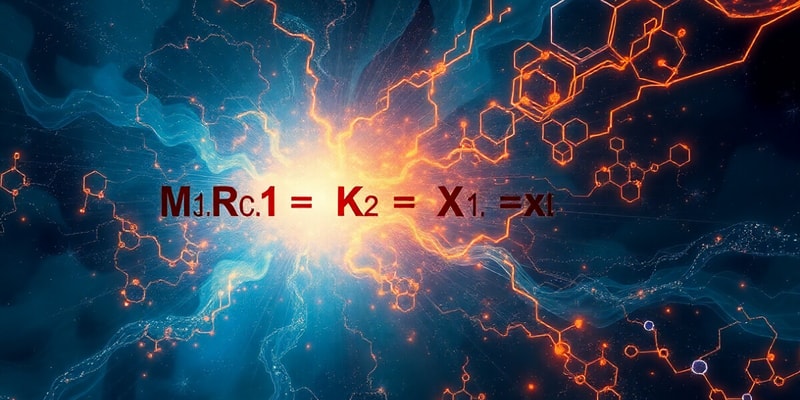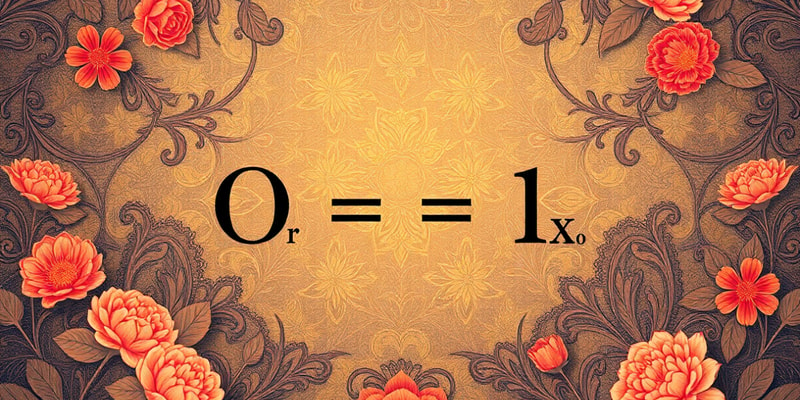Podcast
Questions and Answers
Identify the oxidizing agent in the reaction between SO32- and MnO4-.
Identify the oxidizing agent in the reaction between SO32- and MnO4-.
MnO4-
What is the final balanced equation for the reaction involving sulfite and permanganate ions?
What is the final balanced equation for the reaction involving sulfite and permanganate ions?
5SO32- + 2MnO4- + 6H+ -> 5SO42- + 2Mn2+ + 3H2O
In acidic solutions, how are the oxygen atoms balanced in redox reactions?
In acidic solutions, how are the oxygen atoms balanced in redox reactions?
Oxygen atoms are balanced using H2O molecules.
What is the purpose of including H+ ions in balancing redox reactions under acidic conditions?
What is the purpose of including H+ ions in balancing redox reactions under acidic conditions?
Signup and view all the answers
Identify the change in oxidation state for sulfur in the reaction from SO32- to SO42-.
Identify the change in oxidation state for sulfur in the reaction from SO32- to SO42-.
Signup and view all the answers
How many electrons are involved in the oxidation of SO32- to SO42-?
How many electrons are involved in the oxidation of SO32- to SO42-?
Signup and view all the answers
In the example involving cyanate, what is the oxidized form of CN-?
In the example involving cyanate, what is the oxidized form of CN-?
Signup and view all the answers
What is the reduction reaction when MnO4- is involved?
What is the reduction reaction when MnO4- is involved?
Signup and view all the answers
Explain the importance of mass and charge balance in redox reactions.
Explain the importance of mass and charge balance in redox reactions.
Signup and view all the answers
What role do intermediates like H2O play in balancing redox reactions?
What role do intermediates like H2O play in balancing redox reactions?
Signup and view all the answers
What is the role of H2O in balancing the oxygen atoms in the half-reaction of cyanate?
What is the role of H2O in balancing the oxygen atoms in the half-reaction of cyanate?
Signup and view all the answers
How do you convert the acidic half-reaction of MnO4- into its basic form?
How do you convert the acidic half-reaction of MnO4- into its basic form?
Signup and view all the answers
What do you need to do to balance the charge in the half-reactions?
What do you need to do to balance the charge in the half-reactions?
Signup and view all the answers
What is the significance of adding both H2O and OH- during the conversion from acidic to basic conditions?
What is the significance of adding both H2O and OH- during the conversion from acidic to basic conditions?
Signup and view all the answers
When balancing the final equation, what is meant by 'removing e-' from both sides?
When balancing the final equation, what is meant by 'removing e-' from both sides?
Signup and view all the answers
How is the final balanced equation written, and what does it represent?
How is the final balanced equation written, and what does it represent?
Signup and view all the answers
What are the steps taken to balance the hydrogen atoms in both half-reactions?
What are the steps taken to balance the hydrogen atoms in both half-reactions?
Signup and view all the answers
In the verification process, what must you check regarding charge and atoms?
In the verification process, what must you check regarding charge and atoms?
Signup and view all the answers
Explain the function of the cyanate ion (OCN-) in the reduction step of the overall reaction.
Explain the function of the cyanate ion (OCN-) in the reduction step of the overall reaction.
Signup and view all the answers
The starting equation of the first example involves SO32- and ______.
The starting equation of the first example involves SO32- and ______.
Signup and view all the answers
In the oxidation half-reaction, SO32- is transformed into ______.
In the oxidation half-reaction, SO32- is transformed into ______.
Signup and view all the answers
The reduction half-reaction involves the conversion of MnO4- to ______.
The reduction half-reaction involves the conversion of MnO4- to ______.
Signup and view all the answers
To balance oxygen atoms, ______ is added to the oxidation half-reaction.
To balance oxygen atoms, ______ is added to the oxidation half-reaction.
Signup and view all the answers
To balance hydrogen atoms, ______ ions are included in the reduction half-reaction.
To balance hydrogen atoms, ______ ions are included in the reduction half-reaction.
Signup and view all the answers
The final balanced equation includes 5SO32- and ______.
The final balanced equation includes 5SO32- and ______.
Signup and view all the answers
The skeletal equation for the reaction involving cyanate includes CN- and ______.
The skeletal equation for the reaction involving cyanate includes CN- and ______.
Signup and view all the answers
When balancing redox reactions, it is important to verify both mass and ______ balance.
When balancing redox reactions, it is important to verify both mass and ______ balance.
Signup and view all the answers
The ______ of sulfur changes during the reaction from SO32- to SO42-.
The ______ of sulfur changes during the reaction from SO32- to SO42-.
Signup and view all the answers
In the example involving manganese, the reduction process results in ______ manganese oxide.
In the example involving manganese, the reduction process results in ______ manganese oxide.
Signup and view all the answers
In a redox reaction, the formula for cyanate is ______.
In a redox reaction, the formula for cyanate is ______.
Signup and view all the answers
To balance oxygen in the oxidation half-reaction, ______ is added.
To balance oxygen in the oxidation half-reaction, ______ is added.
Signup and view all the answers
In the reduction half-reaction, ______ ions are used to balance hydrogen atoms.
In the reduction half-reaction, ______ ions are used to balance hydrogen atoms.
Signup and view all the answers
When converting from acidic to basic conditions, ______ is added to each side of the equation.
When converting from acidic to basic conditions, ______ is added to each side of the equation.
Signup and view all the answers
In a balanced chemical equation, the total charge should be ______ on both sides.
In a balanced chemical equation, the total charge should be ______ on both sides.
Signup and view all the answers
The final balanced equation shows 2MnO4^- reacting with 3CN^- and ______.
The final balanced equation shows 2MnO4^- reacting with 3CN^- and ______.
Signup and view all the answers
In the oxidation half-reaction, 2e^- need to be ______ to balance the charge.
In the oxidation half-reaction, 2e^- need to be ______ to balance the charge.
Signup and view all the answers
During the balancing process, 4OH^- is added to the reduction reaction involving ______.
During the balancing process, 4OH^- is added to the reduction reaction involving ______.
Signup and view all the answers
The final equation must balance both the ______ and atoms on each side.
The final equation must balance both the ______ and atoms on each side.
Signup and view all the answers
The oxidation of CN^- involves it being converted to ______.
The oxidation of CN^- involves it being converted to ______.
Signup and view all the answers
In the oxidation half-reaction, CN- is transformed into ______.
In the oxidation half-reaction, CN- is transformed into ______.
Signup and view all the answers
To balance oxygen atoms in the oxidation half-reaction, ______ is added.
To balance oxygen atoms in the oxidation half-reaction, ______ is added.
Signup and view all the answers
The reduction half-reaction involves the conversion of MnO4- to ______.
The reduction half-reaction involves the conversion of MnO4- to ______.
Signup and view all the answers
When converting from acidic to basic conditions, ______ is added to each side of the equation.
When converting from acidic to basic conditions, ______ is added to each side of the equation.
Signup and view all the answers
In the final balanced equation, the total charge is ______ on both sides.
In the final balanced equation, the total charge is ______ on both sides.
Signup and view all the answers
During the balancing process, 6e- are needed to balance the overall charge, which includes ______ from the oxidation half-reaction.
During the balancing process, 6e- are needed to balance the overall charge, which includes ______ from the oxidation half-reaction.
Signup and view all the answers
The final balanced equation shows 2MnO4- reacting with 3CN- and ______.
The final balanced equation shows 2MnO4- reacting with 3CN- and ______.
Signup and view all the answers
To balance hydrogen atoms in the reduction half-reaction, ______ ions are included.
To balance hydrogen atoms in the reduction half-reaction, ______ ions are included.
Signup and view all the answers
Each side of the final equation must balance both mass and ______.
Each side of the final equation must balance both mass and ______.
Signup and view all the answers
In the oxidation reaction, CN- is oxidized to ______.
In the oxidation reaction, CN- is oxidized to ______.
Signup and view all the answers
The starting equation of the second example involves CN- and ______.
The starting equation of the second example involves CN- and ______.
Signup and view all the answers
In the oxidation half-reaction, SO32- is transformed into ______.
In the oxidation half-reaction, SO32- is transformed into ______.
Signup and view all the answers
The reduction half-reaction involves the conversion of MnO4- to ______.
The reduction half-reaction involves the conversion of MnO4- to ______.
Signup and view all the answers
To balance oxygen atoms, ______ is added to the oxidation half-reaction.
To balance oxygen atoms, ______ is added to the oxidation half-reaction.
Signup and view all the answers
To balance hydrogen atoms, ______ ions are included in the reduction half-reaction.
To balance hydrogen atoms, ______ ions are included in the reduction half-reaction.
Signup and view all the answers
The final balanced equation includes 5SO32- and ______.
The final balanced equation includes 5SO32- and ______.
Signup and view all the answers
When balancing redox reactions, it is important to verify both mass and ______ balance.
When balancing redox reactions, it is important to verify both mass and ______ balance.
Signup and view all the answers
The ______ of sulfur changes during the reaction from SO32- to SO42-.
The ______ of sulfur changes during the reaction from SO32- to SO42-.
Signup and view all the answers
In a redox reaction, the formula for cyanate is ______.
In a redox reaction, the formula for cyanate is ______.
Signup and view all the answers
During the balancing process, 4OH- is added to the reduction reaction involving ______.
During the balancing process, 4OH- is added to the reduction reaction involving ______.
Signup and view all the answers
Study Notes
Balancing Redox Reactions - Example 1
- The reaction is between sulfite and permanganate in an acidic solution.
- The redox reaction is: SO32- + MnO4- -> SO42- + Mn2+
- The oxidation half reaction is: SO32- + H2O -> SO42- + 2H+ + 2e-
- The reduction half reaction is: MnO4- + 8H+ + 5e- -> Mn2+ + 4H2O
- The final balanced equation is: 5SO32- + 2MnO4- + 6H+ -> 5SO42- + 2Mn2+ + 3H2O
- Both sides of the equation have the same number of atoms and charges.
Balancing Redox Reactions - Example 2
- The reaction is between cyanide and permanganate in an aqueous basic solution.
- The redox reaction is: CN- + MnO4- -> MnO2 + OCN-
- The oxidation half reaction is: CN- + 2OH- -> OCN- + H2O + 2e-
- The reduction half reaction is: MnO4- + 2H2O + 3e- -> MnO2 + 4OH-
- The final balanced equation is: 2MnO4- + 3CN- + H2O -> 2MnO2 + 3OCN- + 2OH-
- Both sides of the equation have the same number of atoms and charges.
Balancing Redox Reactions - Example 1
- The initial equation is SO32- + MnO4- -> SO42- + Mn2+
- Sulfite (SO32-) is oxidized to sulfate (SO42-).
- Permanganate (MnO4-) is reduced to Mn2+.
- The redox reaction is balanced in acidic solution.
- The final balanced equation is: 5SO32- + 2MnO4- + 6H+ -> 5SO42- + 2Mn2+ + 3H2O
- The equation is balanced with 5 sulfur atoms, 2 manganese atoms, 23 oxygen atoms, and 6 hydrogen atoms on each side.
- The equation also has a charge balance of -6 on each side.
Balancing Redox Reactions - Example 2
- The initial equation is CN- + MnO4- -> MnO2 + OCN-.
- Cyanide (CN-) is oxidized to cyanate (OCN-).
- Permanganate (MnO4-) is reduced to manganese dioxide (MnO2).
- The redox reaction is balanced in basic solution.
- The final balanced equation is: 2MnO4- + 3CN- + H2O -> 2MnO2 + 3OCN- + 2OH-
- The equation is balanced with 2 manganese atoms, 3 carbon atoms, 3 nitrogen atoms, 9 oxygen atoms, and 2 hydrogen atoms on each side.
- The equation also has a charge balance of -5 on each side.
Balancing Redox Reactions - Example 1
- Sulfite (SO32-) is oxidized to sulfate (SO42-)
- Permanganate (MnO4-) is reduced to manganese(II) (Mn2+)
- The oxidation half-reaction occurs in acidic solution
- Oxygen is balanced by adding H2O to the products side for the oxidation reaction and reactants side for the reduction reaction
- Hydrogen is balanced by adding H+ to the reactants side of the oxidation reaction and the products side of the reduction reaction.
- Electrons are balanced by adding 2e- to the products side of the oxidation reaction and 5e- to the reactants side of the reduction reaction.
- The oxidation half-reaction is multiplied by 5 and the reduction half-reaction is multiplied by 2 to ensure the number of electrons gained and lost are equal.
- The resulting balanced redox reaction is: 5SO32- + 2MnO4- + 6H+ -> 5SO42- + 2Mn2+ + 3H2O
- The final equation is verified by ensuring mass balance and charge balance.
Balancing Redox Reactions - Example 2
- Cyanide (CN-) is oxidized to cyanate (OCN-)
- Permanganate (MnO4-) is reduced to Manganese(IV) oxide (MnO2)
- The redox reaction occurs in basic solution
- Oxygen is balanced by adding H2O to the products side of the oxidation reaction and reactants side of the reduction reaction
- Hydrogen is balanced by adding H+ to the reactants side of the oxidation reaction and the products side of the reduction reaction.
- The acidic solution is then converted into basic solution by adding sufficient H2O to both sides of the equation.
- For each H+ added, OH- is added to the same side of the equation.
- H2O is added to the opposite side of the equation.
- Electrons are balanced by adding 2e- to the products side of the oxidation reaction and 3e- to the reactants side of the reduction reaction.
- The oxidation half-reaction is multiplied by 3 and the reduction half-reaction is multiplied by 2 to ensure the number of electrons gained and lost are equal.
- The resulting balanced redox reaction is: 2MnO4- + 3CN- + H2O -> 2MnO2 + 3OCN- + 2OH-
- The final equation is verified by ensuring mass balance and charge balance.
Studying That Suits You
Use AI to generate personalized quizzes and flashcards to suit your learning preferences.
Related Documents
Description
This quiz provides examples of balancing redox reactions, including reactions between sulfite and permanganate in acidic conditions and cyanide with permanganate in basic conditions. Participants will learn to identify oxidation and reduction half-reactions and achieve balanced equations for each scenario.




